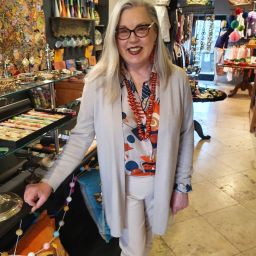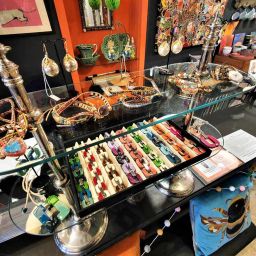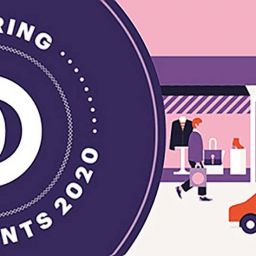This article by JAC & Josie Beeson was first published at drapersonline.com. You can view the original article here.
As the owners of lifestyle independent Abrahams Store in the north of England, we feel our sector is being handed an increasingly raw deal, which needs to be addressed by the government as a matter of utmost urgency.
Every area of the fashion business has been, and continues to be tested by Covid and Brexit. Since the onset of the coronavirus crisis 12 months ago, we, like all non-essential retailers have been forced to close our doors not once, not twice, but three times, despite investing money to ensure that all the required safety measures for both customers and staff were in place from the outset.
Since the pandemic began, it has been increasingly galling to witness the growing number of high street multiples, supermarkets and other “essential” retailers continuing to ignore government regulations by offering “non-essential” goods for sale, while small independent shops have followed the rules and remain closed.
The rise of the multiples has sapped profit from the local community, transferring it to shareholders who are unlikely to re-invest the money in the locality
To add insult to injury, online stores have substantially increased their market share of clothing sales during this time. It is hoped that the government will redress the balance through fairer measures so indies can recoup some of their losses caused by the pandemic.
There needs to be a levelling-up of opportunity between high street retail and online retailers. It’s clear that the government needs to raise revenue and says it wants high streets to remain key parts of local economies – and Drapers’ Reset Fashion Retail campaign supports this. Key to this are the margins that are realistically possible.
For those with a warehouse and able to sell thousands of each item, a tiny margin may well be sustainable but for those who can only stock and sell a few tens if that, the margin has to be higher to be acceptable. Many of the out-of-town warehouses have been established in development areas with the help of government grants to address high unemployment levels. This policy has exported jobs from towns to new developments. At the same time the rise of the multiples has sapped profit from the local community, transferring it to shareholders who are unlikely to re-invest the money in the locality.
Principally, many high street independents are looking for some form of taxation on delivery or distribution costs that is proportionate to usage. Thus, the largest businesses who ship the most will pay proportionally more than small businesses that only send out a tiny proportion of their sales through delivery channels.
Boutiques in Business’s next campaign hopes to spread the message “Buy unique, shop boutique”
This would also avoid the difficulties of levying corporation tax on non-dom businesses, as the liability would be in the cost of sales rather than profits. This could also be a flat rate tax – there would be no need for regression.
Some might say that bricks-and-mortar shops will not survive without an online presence. This is partly true, but it is essential to remember that most indies differentiate themselves by providing what online shops cannot – only they can offer a “sensory” experience where products can be touched, smelled or tasted, as well as being able to give a higher degree of customer service that cannot be achieved in the same way through online channels.
That said, indies have taken up the challenge to sell at least some of their products via the internet. Most will not be able to find the resources to fund a full-blown online shop. However, they have been creative in finding other ways to communicate with their customers, and find new ones – Instagram, Facebook, Etsy and Shopify are just some of the channels that are now being used successfully.
Similarly, even if the financial resources are available, smaller indies often lack the capacity to carry the stock levels needed, handle dispatch and the inevitable returns to operate online at scale.
Like many shop owners struggling with the immense problems caused by Covid-19, Brexit and uncertainty about the future, fashion indies have sought advice and support where they can. One avenue that is proving to be indispensable is Boutiques in Business (BIB). This private members’ group was created in the face of Covid-19 by another north of England-based clothing retailer Amanda Leigh Slattery in 2019, “by boutiques for boutiques”, and is proving to be an invaluable and reliable platform for discussion and problem solving.
Confidentiality is essential to the group, so our members can raise any concerns in the knowledge that all discussions are private. The benefits are many: shared knowledge, helpful tips, great camaraderie, and the generous support shown to members have helped many through what has and still is a devastating period.
BIB wants their voice to be heard and is achieving this. Our mannequin protest over the lockdowns in November last year caught the eye of the many media outlets. BIB’s next campaign – launching next month – hopes to spread the message “Buy unique, shop boutique”, as a reminder to consumers that their help is needed to get indies back on track.
Although BIB represents boutiques, it is not just fashion indies that have endured the ongoing problems over the last 12 months – virtually all independent retailers have suffered.
Bira (the British Independent Retailers Association) has a membership of more than 6,000 businesses across all retail sectors, and offers its paying members a wide range of benefits, including advice on rates and rent, planning and financial information, as well as its legal services.
Bira has linked up with BIB to help represent its members’ ongoing concerns about Covid-19 and the new minefield of rules surrounding Brexit in particular. This mutually beneficial tie-up illustrates Bira’s commitment to assist BIB in its ongoing quest for a level playing field for all retailers.
By continuing to influence the media and to change government legislation to a fairer system than is currently the case, Bira CEO Andrew Goodacre has been meeting with business, energy and industrial strategy secretary Kwasi Kwarteng to discuss ways in which the high street can be rebuilt post-pandemic.
BIB members are encouraged by the proactive nature of Bira’s methods and are committed to working to find a solution to the difficult issues that are affecting us all currently. Both BIB and Bira wish to extend these ongoing discussions to include fashion agents and distributors. To this end, BIB and Bira have held conversations with several larger agencies regarding the minefield of confusion surrounding tariffs, VAT, country of origin and courier levies on importing and exporting goods both inside and outside the European Union.
All parties agree that there is much common ground to be covered and by working together as a triumvirate BIB, Bira and fashion agencies solutions can be found to everyone’s satisfaction and benefit.
Fashion Roundtable is also working hard to identify the full effects of Brexit on our industry and reading their findings is eye-opening to say the least.
Bouncing back from Covid and taking full advantage of the promised Brexit opportunities will be more easily achieved with organisations like BIB and Bira giving a strong voice to independents. The question is, will the government be listening to our suggestions?






